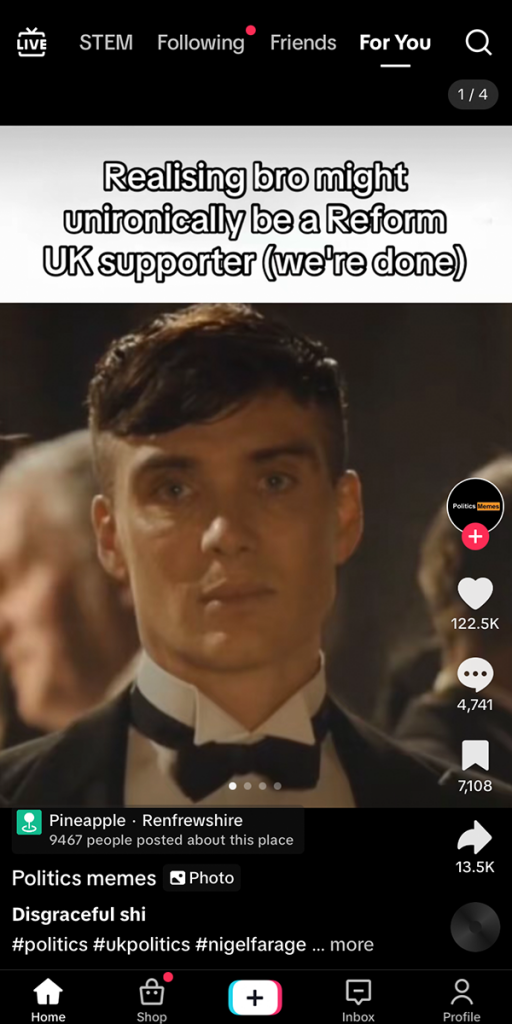We went beyond our familiar algorithms to understand the uncomfortable truths about echo chambers, and how to break out of them
Brexit revealed a series of fault lines in British society nine years ago: 48.1% voted to remain, and 52.9% to leave. Remainers were shocked. So much so they launched a campaign for a second referendum which ran until the eve of the UK’s official exit from the EU.
Echo chambers, environments where people only come across opinions that align with their own, played a huge part in this, according to a study from the London School of Economics.
Professor of comparative politics at the University of Reading, Katharina Lawall explained our news diets have always been partisan to our political allegiance, creating these echo chambers. But her co-authored study found algorithms exacerbated echo chambers, since extreme content receives the greatest engagement. In turn, online echo chambers created a more divided and polarised democracy.
Polling data from the regulatory body regulatory body IPSO found that 85% of Britain think the country is divided according to polling. And Reform, a once fringe Brexit party, is climbing in opinion polls. The latest UK gov figures show Reform UK held 25% of the vote, their joint-highest score to date, up from 23% in the previous poll on 26-27 January.
With the dawn of Tr*mp, the rise of tech oligarchs, and a continuous wave of populist nationalism running through Europe, now is not the time to sit pretty and enjoy your Brat edits of Kamala Harris.

With that in mind, DITCH sent two reporters into two opposing echo chambers: one on the far left, and one on the far right of find out how harsh these boxes are and how these can encourage extreme views.
How it works
We both created TikTok accounts and followed the relevant left and right wing people.
Right wing account: El*n M*sk, The Reform Party, Fox News, Nigel Farage, Ben Shapiro, D*nald Tr*mp.
Left wing account: AOC, Bernie Sanders, Maxwell Frost, Jeremy Corbyn, Caroline Lucas, LabourUK, Labour Party, The Democrats, The Communists
We then followed our noses, interacting and liking the content that would be favoured by our chosen echo chambers.
EVA who has interest in politics or anything that makes her laugh, ventures into the dark and disturbing world of the right wing- filled with fake and fragile egos

The first videos I scrolled through were fairly innocuous. A series of memes, funny videos and general brain rot. I was almost worried if I was going to be able to break into this echo chamber through my FYP alone.
Thankfully (?!), the tiktoks soon began to slip in slightly racist, sexist videos – and a whole lot of Tr*mp’s ‘funniest moments’ edits.

The whole thing felt like when you’re at the pub chatting away to a friendly codger, and then the jokes start to get a bit hairy, and you start to think, “this person might be racist.” You grab your pints from the bar, retreat back to your friends and avoid that section of the bar for the rest of the night. This time there was a difference: I wouldn’t be retreating, I was settling in for the night.
After the questionable memes, came dose of nostalgia for the past: a fondness for the Britain people once knew in their childhoods, a yearning to return to the simple life. Then, before I knew it, romanticised edits of imperial Britain appeared.
There was a huge focus on the superiority of ‘pure’, white societies. Videos asked, “have you ever noticed that the more ‘diverse’ the West becomes, the sh!ttier it gets in every way?”
Another said, “Europeans colonised the world and brought civilisation,” and one warned, “transplant us anywhere and look what it will become.”
There was also a f*cking horrendous utopian style Lord of the Rings edit.
The rhetoric so far fitted into my preconceptions of the far-right thinking. What caught me by surprise though was the absolute obsession my algorithm had with Rhodesia.
Rhodesia was a British colony in Africa (1890–1965), which then became an unrecognized white minority-ruled state until 1979. In 1980 it won independence and became modern-day Zimbabwe.
Head of the southern poverty law center’s intelligence project, Heidi Beirich, told the New York Times the uptick of pro-Rhodesian messaging is a purposeful amplification of the ideology and practice of “racist colonial regimes.”
She added, “when you praise Rhodesia, in this context, what you’re praising is violence to that end.”
The comments on these videos were also explicitly Islamophobic. “F*ck Islam” was often the top comment of these videos. Meanwhile, I noticed I was being targeted with ads for Muslim prayer cards. If the algorithms were pushing anti-muslim content towards me, then the influx of adverts targeted towards Muslims seemed explicitly provocative on the part of the algorithms. It’s worth mentioning in my everyday social media use I’d never been targeted by these kinds of ads before.
Between the racist, imperialist and anti-muslim content came content which gave the sense that people on the right were fighting against societal oppression.
Motivational videos promoted hustle culture, promising capitalist dreams of supercars, Dubai holidays and paper notes stacked high. These videos featured a steady stream of complaining about the state of the UK economy, and the difficulty in finding a well-paid job. The hyper-productive videos seemed to promote a feeling of hope and agency against the backdrop of our dragging economy.
There was also an overwhelming feeling that being on the right causes you to be discriminated against in society. Reformers were complaining of being called a far-right thug just because they support Nigel Farage. El*n M*sk fans lamented the abuse he received for doing a salute that looked eerily similar to a nazi salute: “liberals when they make fun of an autistic man giving his heart to the crowd.” Students bragged, “getting an A+ after pretending to be a liberal on an assignment.”

It seems it’s a tough life to be an anti-woke, common sense talking rightie.
To be completely honest, the echo chamber absolutely stank of uncertainty. The racist nostalgia revealed an insecurity about their position in the modern world, and hustle culture brought a feeling of autonomy to people who increasingly despair about the limited opportunities within the economy and the rising cost of living.

MAGDA lover of all things film and theatre, takes a deep dive into the land of left-wing memes – reinforcing the idea that we are the good guys and we are always right!
As someone who already considers themselves left-leaning, I wasn’t expecting my social media feed to change all that much when setting out to do this challenge. At first, I wasn’t entirely wrong. A lot of what I saw felt familiar – people speaking out against injustice, venting about the state of the world, calling for action. A political meme here and there. The main difference was volume, but that was to be expected – I had deliberately followed accounts that align with left-wing politics.
So, I scrolled. I liked a couple videos. I followed more accounts. And then something shifted.
On my regular feed, I didn’t see right-wing content at all – but I did see criticism of both the left and the right. I assumed it’s because I didn’t typically engage much with political content, so the algorithm didn’t think I cared. Instead, it fed me pop culture, film reviews and stupid memes.

The moment the algorithm realised I did care about politics, it went all in. And what did it do with that information? Memes. Thirst traps of Dean Withers. Edits of Kamala Harris with the caption, “she’s so relatable.” And, of course, conspiracy theories. I saw a three-minute video discussing whether M*sk tweeting 14 American flags in response to Tr*mp meant we should prepare for the end of the world.
The more I engaged with political content, the more my For You Page abandoned any semblance of nuance or critical thinking. And that’s terrifying.
Conclusion
At face value, we are politically divided. And algorithms and echo chambers make this division a whole lot worse. From our research, these divided viewpoints are pitted against each other, antagonizing fears and removing important nuances.
While this might all seem too overwhelming, there is light. Professor Lawall warns against fatalism towards echo chambers and political polarization.
“There are things we can do to disrupt these more homogenous social networks,” she explains.
Her research showed that just a 20-minute conversation over Zoom with a stranger with an opposing viewpoint can positively change your opinion of them.
Even more positively: “We’re quite confident that maybe if you did something like this in real life, it would have, it should have even stronger effects.”
So, if that’s the case, next time you’re confronted with an old codger with questionable opinions, take a seat next to him and have a chat. Understand the people around you in society, and DITCH the temptation to stick to your own echo chamber.

